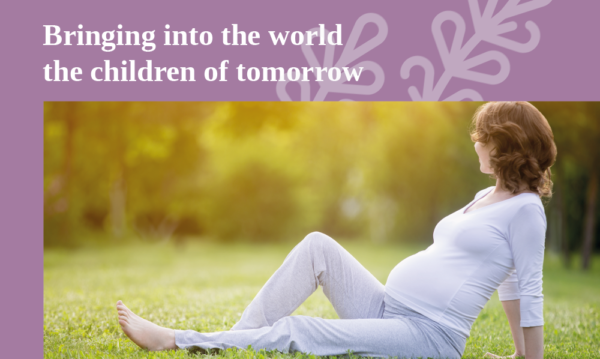We often hear that the first three years in a child’s life are the most important. So, in the first three years with our children, we do the right activities, buy the right toys and read the right books.
However, recent research shows that the fetus is already aware, responsive, and emotionally active at six months of pregnancy. At six months, the unborn child can see, hear, taste, feel, even learn.
Thus, the physical and emotional health of a child is formed before it is even born. Part of this configuration is determined by how parents – especially the mother – feel about their lives and relationships.
The mental health of the couple who wishes to have a child plays a decisive role in forming this young man. Proper preparation of the couple for the conception and gestation of the child is crucial for his health, mental balance, personality, inclinations, and talents. It also determines its psychosynthesis and whether it will have the moral values of life in it.
Future parents preparing to bring a child into the world need to know that they are not just preparing a baby, a child at all ages but preparing the man, the citizen of tomorrow. The baby that will come to life will have been “nurtured” with life values, which will lead it to behave in one way or another when it begins to pass into puberty or mature later as an adult person and participate in community life.
Epigenetics for the development of the fetus
According to new research in epigenetics, negative or positive mood during pregnancy can change the development of the fetus’s nervous system and affect genetic expression.
Bruce Lipton (biologist, Ph.D. neuroscientist, and Stanford researcher) describes how a mother’s thoughts before birth allow the unborn infant to optimize its genetic and physiological development: “Genes are not destiny! The effects of the environment, including diet, anxiety, and emotions, can modify these genes without changing their basic blueprint. And these modifications, discovered by epigeneticists, can be passed on to future generations.”
“It is biologically impossible for a gene to function independently of its environment: genes are designed to be regulated by the signals of their immediate environment, some of which are heavily influenced by our social interactions,” says Daniel Goleman, in his book Social Intelligence.
Negative thoughts are often the cause of negative anxiety reactions based on fear. Chopra states, “Stress activates the child’s endocrine system and affects the development of the child’s brain. Children born to mothers with severely stressful pregnancies are more likely to have behavioral problems in later life”. Verny agrees, “… studies have shown that mothers with severe and continuous stress are more likely to have babies prematurely, with lower-than-average weight, hyperactive, irritable and colic.” Lipton in 6 special studies, writes, “When passed through the placenta, the hormones of a mother experiencing chronic stress will radically change the distribution of blood flow to the fetus and change the character of her child’s development physiology.” Chopra writes, “When you’re stressed, you release stress-coded chemicals and every cell in your body gets the message.” These cells include the developing fetus.
On the other hand, says Dr. Verny, “Positive maternal emotions seem to promote the health of the unborn child.” And he goes on, “… thoughts that infuse the developing baby with a sense of joy and calm can establish a balanced, joyful and peaceful mood for the rest of life.” Chopra agrees, “When we are happy, our body produces natural pleasure chemicals called endorphins and encephalins. When we are calm and relaxed, we release chemicals similar to those of sedative pills.” Without stress, says Chopra, “your baby’s nervous system runs smoothly. When you are calm, your baby can develop peacefully.”
Creating a child’s personality
Psychologists now argue that prenatal life and birth experience are often determinants of human personality and competence. Properties such as self-confidence, depression, and addictive behavior are attributed to experiences within the uterus. (Thomas Verny, Nurturing the Unborn Child)
On some level, what the pregnant mother feels, conveys directly to her unborn child. Because of this, constant negative emotions can have a devastating effect on the fetus.
The fetus absorbs negative emotions, such as anger, anxiety, or worry, emotions that all adults experience in their stressful daily lives. However, the most significant harm is done when a mother does not want the child. These and other negative emotions hurt the formation of the baby’s psychosynthesis.
The father also plays a decisive role. During pregnancy, the fetus is also affected by the father’s feelings towards the mother and his child. That is because the fetus can absorb the emotional energy of its parents. This action helps to create the perception that the child will have of himself in later life. For example, the child will feel happy or sad, safe or unsafe, become aggressive or meek. And some research suggests that parents begin to affect their children’s lives shortly after conception.
What messages do you send your child?
Research shows that there is a level of consciousness in the fetus in a short time after conception. As the fetus develops, its subconscious stores information that prepares it for its mother’s environment. But the role of the father concerning the mother is equally important.
From the sixth month, the fetus can hear and move to its mother’s voice rhythm. Imagine the different influence that exists if the mother sings cheerfully or shouts angry.
It’s not surprising that ultrasounds taken when parents yell at each other show the baby’s entire body twitching with arousal. Imagine the damage caused after months of transmission of this negative energy to the baby. Studies show that parents’ poor relationship increases the risk of psychological and physical harm to the baby by 200% or more!
How do subconscious thoughts affect your fetus?
Another powerful way for parents to influence their fetus is through their beliefs. Our whole lives reflect our ideas, which come from our life experiences and our interactions with other people. The majority of these beliefs are subconscious and quietly plan our minds to react to our world. If these beliefs are negative, they plan our minds to be self-destructive. Every day we see people saying, “I can’t…”, “I’m not good enough to…”, “I’m so unlucky…” and so on.
As future parents, negative programming usually comes from fear: “Will I make the same mistakes my parents made?” … “Will my baby be healthy, and will I be able to give birth naturally?” … “Will I be able to provide my child with what he needs?”
Single mothers face additional negative emotions, such as: “Will I be enough for my baby without his father’s presence?” … “Can I raise my child?”
During pregnancy, parents who live with negative thoughts transmit these feelings to the fetus. In turn, they implant fear within the child, even before it “comes” into the world.
Both mother and father need to understand their feelings and effectively deal with them. The mother’s constant anxiety affects her unborn child. If the mother’s thoughts and feelings are positive and supportive or negative and dismissive, they contribute to the child’s personality’s determination and formation.
Practicing optimism raises a happier and healthier child
If negative thinking is the root cause of the devastating stress reaction, practicing mental envisioning can reprogram a positive solution. In his book “Magical Beginnings, Enchanted Lives, ” Chopra shows pregnant women how to change their thoughts and feelings towards joy to release beneficial chemicals in the unborn baby. Verny, Goleman, and Chopra teach versions of the mental depiction.
“Thoughts and words are transformed into flesh.”, says Chopra, “Every experience has an impact on our biology.” The solution he proposes is to “change our experiences” consciously.
Goleman writes, “Epigenetics shows how our environment translates into the directly chemical environment of a given cell and programs our genes in a way that determines how active they will be.”
Dr. Verny says, “There is no doubt that the mother’s diet is important for the development of the baby…”, but “the senses, feelings, and thoughts plunge the unborn child into a primordial world of experiences, constantly directing the development of the mind.”
And perhaps the wisest of all:
“Pregnancy is not something that happens within the woman; it is a miraculous process of co-creation. For nine months, the woman has been the environment of her baby, and her baby is affected by every experience” Deepak Chopra, MD, Magical Beginnings, Enchanted Lives
The aim is to give a positive tinge to your experiences and practice until your thoughts and perceptions are filtered through the lens of love. Maybe it’s the most significant gift you can offer your child.
References:
Get fit for birth (n.d.). Thoughts and feelings affect your unborn child.
Goodlatte, J. (2013). A mother’s emotions affect her unborn child.
Nelli, K. (2012). Your thoughts affect your unborn child.
Small J. (2014) Your thoughts and their effect on your unborn baby.
Interview with Ioanna Mari: Prenatal education for a better world.
To believe is to be (n.d.) How a parent’s thoughts shape their unborn child’s life.


